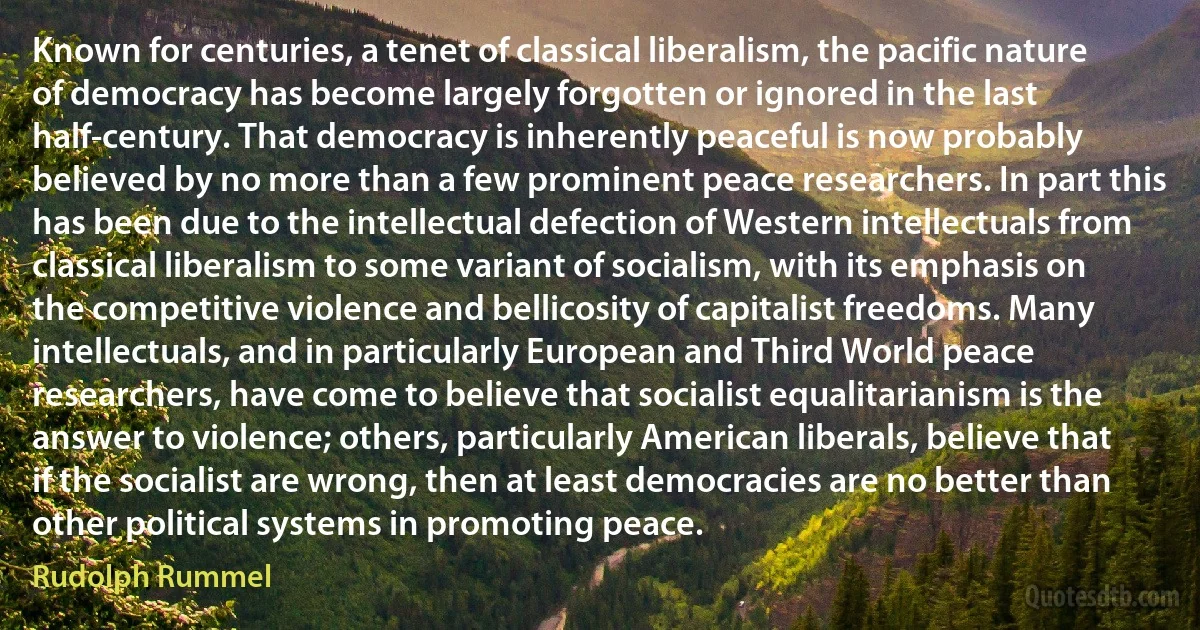
Known for centuries, a tenet of classical liberalism, the pacific nature of democracy has become largely forgotten or ignored in the last half-century. That democracy is inherently peaceful is now probably believed by no more than a few prominent peace researchers. In part this has been due to the intellectual defection of Western intellectuals from classical liberalism to some variant of socialism, with its emphasis on the competitive violence and bellicosity of capitalist freedoms. Many intellectuals, and in particularly European and Third World peace researchers, have come to believe that socialist equalitarianism is the answer to violence; others, particularly American liberals, believe that if the socialist are wrong, then at least democracies are no better than other political systems in promoting peace.
Rudolph RummelRelated topics
answer believe capitalist classical defection due emphasis few forgotten intellectual known last liberalism nature now pacific peace socialist tenet third western world wrong others half-centuryRelated quotes
In all countries and in all historical times there have been individuals to whom multitudes have looked for guidance in religion. Buddha, Lao Tse, Confucius, Moses, Zoroaster, Shankara, Jesus, Muhammed, Joseph Smith, and Mary Baker Eddy were such individuals. New examples are to be found within the lives of many of us. Pure democracy or sheer equalitarianism in religious matters is not to be expected of our human nature. Some distinction between leaders or founders and followers or disciples seems to be our destiny. But there is a question of degree, or of qualification. To what extent, or under what conditions, are some individuals, or perhaps is some unique individual, worthy of trust in religious matters? It is in the answer to this question that mistakes can be made.

Charles Hartshorne
A final aspect of all open access orders is Schumpeter's notion of creative destruction, one of the most powerful descriptions of a competitive, open access economy. When Schumpeter wrote Capitalism, Socialism, and Democracy in the early 1940s, the economic theory of perfect competition among atomistic firms (i. e., firms too small to have market power) had come under sustained attack as unrealistic. Large and powerful economic organizations dominated the new economy, and their behavior did not match the textbooks. Despite this dominance, the economy produced historically unprecedented, sustained economic development. Schumpeter asked, How could large businesses that were supposed to choke off competition and growth nonetheless generate such spectacular productivity increases in a world that seemed ever more competitive?

Douglass North
The European Union is not, in fact, a union at all, but a continent-wide political coup. What began as a common market has now metamorphosed by stealth into a supranational political dictatorship, a parasitical organism living on the backs of the European nation states, sucking their lifeblood and slowly killing them off; a bureaucratic tyranny that wants to "harmonize" out of existence the national identities that have made Europe a continent of genuine diversity and a cultural crucible whose values have shaped the entire western world. But they want to put a stop to all that in the European Union of Soviet Socialist Republics, and this is why European laws are never enacted in response to any kind of organic need in society, but as top-down directives intended to impose indiscriminate uniformity for its own sake.

Pat Condell
There is a process of slow modification and development mainly in directions which I view with misgiving. "Tory democracy," the favourite idea on that side, is no more like the Conservative party in which I was bred, than it is like Liberalism. In fact less. It is demagogism ... applied in the worst way, to put down the pacific, law-respecting, economic elements which ennobled the old Conservatism, living upon the fomentation of angry passions, and still in secret as obstinately attached as ever to the evil principle of class interests. The Liberalism of to-day is better ... yet far from being good. Its pet idea is what they called construction, - that is to say, taking into the hands of the State the business of the individual man. Both the one and the other have much to estrange me, and have had for many, many years.

William Ewart Gladstone
Is the Unionist party, the Conservative party, to be without a definite policy of social reform? It is to our party that they owe the whole of that body of legislation connected with the Factory Acts, free education, the distribution of lands in the shape of allotments and small holdings, the compensation for accidents to workmen in the course of their employment...The policy of resistance, of negation, is no sufficient answer to that Socialist opinion which is growing up amongst us-the Socialist opinion the objects of which are, after all, worthy of earnest and even favourable consideration...that policy, by whomsoever propounded, is a policy which means money, which means expenditure, it is closely connected with the third object of our party officially declared-that fiscal reform is the first constructive policy of the Unionist party.

Joseph Chamberlain
